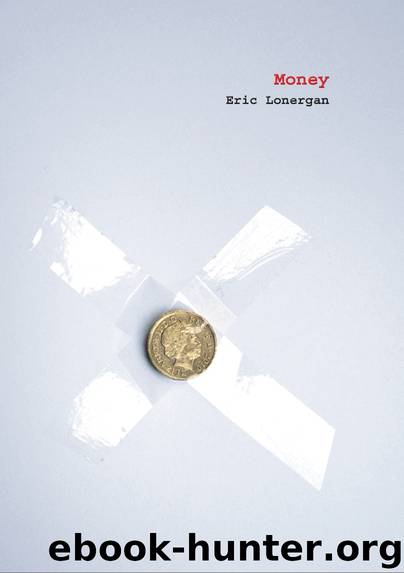Money by Eric Lonergan

Author:Eric Lonergan [Lonergan, Eric]
Language: eng
Format: epub
Tags: Business & Money, Philosophy
ISBN: 9781351558013
Google: DS8rDwAAQBAJ
Amazon: B0046A9MJA
Publisher: Routledge
Published: 2014-08-19T03:00:00+00:00
7 Money measures
MARLOW [gestures menacingly at the big ring on Andre’s hand]: That’s nice.
ANDRE: What? Oh, you like that? I had it for a long time now, it got some sentimental values. It’s just a thing.
MARLOW: What’s the real value?
ANDRE: Huh?
MARLOW: Real value. I ain’t much for sentiment.
(The Wire , Season 4, “Refugees”)
Can money measure anything other than itself?
If you can measure, you can compare. If you can measure, you can aggregate. If you can measure and aggregate, you can compute; and if you can compute, technology now permits perhaps limitless sophistication of analysis. But measurement is one-dimensional and always leaves something behind. The cost of measurement is usually measured by some loss of understanding.
Money was designed to value goods and services in exchange . Prices are a means to exchange different goods, by a single unit of measurement: money. Exchange in a complex division of labour is greatly facilitated by a common standard of measurement. By introducing a market, money can be used to measure almost anything. In fact, at some point in history, human beings have probably priced everything. Nothing is intrinsically outside the range of exchange.
But price is not value. The term “value” is ambiguous. “Valuable” is sometimes a synonym for “expensive”. But often we use the word to describe things we really care about. Monetary value is not determined by usefulness or importance, but by scarcity. Diamond jewelry is hardly useful, although it does twinkle, and can impress, and sometimes more than just impress. Air is essential, but currently free. Clean air may become expensive if it becomes scarcer, as people will attempt to migrate to countries and cities with better air quality.
Marx rightly makes a great deal of the difference between the usefulness of things and the price of things. He uses terminology originally introduced by Adam Smith: value in use and value in exchange . The terms are self-explanatory: value in exchange is price; and value in use , refers to the degree of usefulness. Marx identifies the tendency of capitalism and markets to corrupt our sense of the use or true value of things, with an obsession with the monetary value. By rejecting his body of work, economists have ignored this reflexive dimension of price and money. Conventional economics assumes, a priori , that we hold beliefs, values and wants independently of the price signals determined in markets. Marx was aware that our attitudes, beliefs and wants themselves change as soon as things are priced, valued or “commodified”; we confuse exchange value with something more, we are seduced by it.
The price of blood
A very striking example of how pricing something might change our attitude towards it was provided in 1970 by a professor at the London School of Economics. Richard Titmuss argued in The Gift Relationship that paying for blood donation would reduce the amount donated. Now Titmuss was not just raising a specific point about how best to organize blood donation, he was challenging the neutrality of monetary exchange in social activity.
The
Download
This site does not store any files on its server. We only index and link to content provided by other sites. Please contact the content providers to delete copyright contents if any and email us, we'll remove relevant links or contents immediately.
The remains of the day by Kazuo Ishiguro(7540)
Tools of Titans by Timothy Ferriss(6934)
The Black Swan by Nassim Nicholas Taleb(6182)
Inner Engineering: A Yogi's Guide to Joy by Sadhguru(5886)
Giovanni's Room by James Baldwin(5870)
The Way of Zen by Alan W. Watts(5787)
The Six Wives Of Henry VIII (WOMEN IN HISTORY) by Fraser Antonia(4784)
The Power of Now: A Guide to Spiritual Enlightenment by Eckhart Tolle(4747)
Astrophysics for People in a Hurry by Neil DeGrasse Tyson(4613)
Asking the Right Questions: A Guide to Critical Thinking by M. Neil Browne & Stuart M. Keeley(4564)
12 Rules for Life by Jordan B. Peterson(3722)
The Ethical Slut by Janet W. Hardy(3494)
Skin in the Game by Nassim Nicholas Taleb(3455)
Housekeeping by Marilynne Robinson(3395)
The Art of Happiness by The Dalai Lama(3376)
Double Down (Diary of a Wimpy Kid Book 11) by Jeff Kinney(3267)
Skin in the Game: Hidden Asymmetries in Daily Life by Nassim Nicholas Taleb(3259)
Walking by Henry David Thoreau(3227)
12 Rules for Life: An Antidote to Chaos by Jordan B. Peterson(3195)
